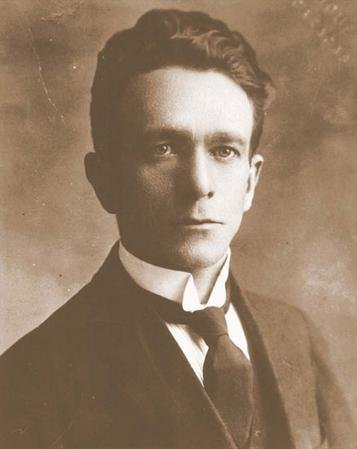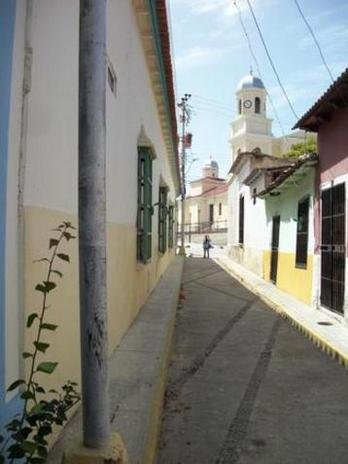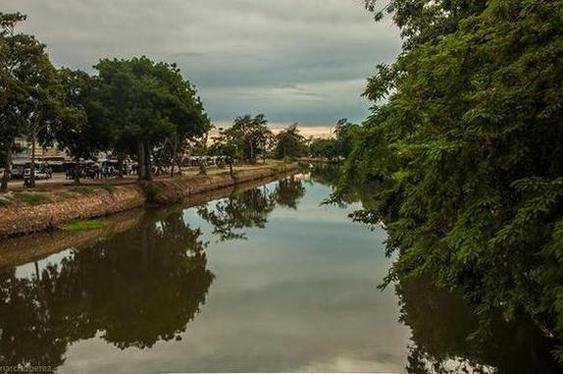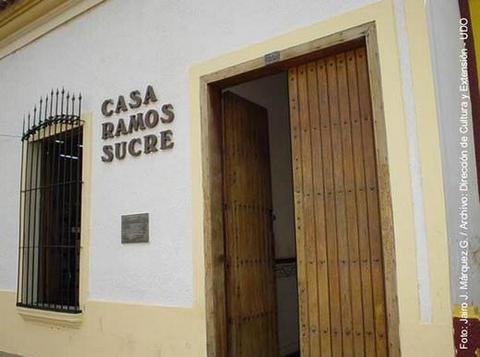ADSactly Literature: Ramos Sucre And The Reminiscent City

In previous occasions I have shared in this blog articles about the Venezuelan and universal poet José Antonio Ramos Sucre (Cumaná, Venezuela, 1890 - Geneva, Switzerland,1930), of capital importance for modern Spanish-speaking literature and even other languages. His poetic work was written, almost in its entirety, taking the form of the poem in prose, introduced by Bertrand and Baudelaire and cultivated by Rimbaud and Rubén Darío.
This time I deal with the particular theme of his relationship with the city.

Space is a constant that runs through the poetic work of José Antonio Ramos Sucre. In it the places compose a vague, evocative and virtual geography, where the real is an enunciated figure or almost mythical reminiscence. Topography of the dream (often nightmare) or of the "solitary dream". Housed in places, moving towards or from them, the "I" speakers / characters of Ramos Sucre's work describe a triad of possibilities in front of space: permanence, arrival or abandonment, which make up a persistent restlessness of movement, or its negation. Nomads, condemned, warriors, exiles, etc., integrate the pleiad of protagonists of such displacements or stays in different and strange environments: ruins, jungles, ports, islands, among others.
A privileged and fundamental place in this "poetics of space" is the city. Unnamed and diffuse, sometimes named, in other cases, with the nuance of an archetypal sketched image: Jerusalem, Rome, Carthage, Venice, Castile..., the city founds a significant recurrence, both ethereal and corporeal. It can open a poetic atmosphere or fill the whole discourse of the poem's I, as in the case of "The clamor" from The enamel sky, to cite an example.
I have left that city during the narcotic sleep of the night and I have forgotten the way back.
(…)
I have interviewed the city in the course of a soliloquy, finding myself sick and gaunt.
(…)
I wasn't used to leaving home in the city of my childhood. My parents stopped me at the door of the street with a gesture of terror.

The city, like a material and changeable fragment, appears forming fleeting statements in the voice of the speaker/personage. It integrates and dislocates the presence remembered, dreamed or hallucinated, bursting in with the most diverse characterizations, specified by the author's exact adjective: city "of infecund contour", "mustia", "immemorial", "fateful", "abandoned"... Impregnate this presence, as in other writers and works, one can identify the ambivalent sense of lost, rejected and desired origin: "... retiring to this my native city", as the speaker of the poem "The life of the damned" says, or that of the poem "The captive of a shadow: "Misfortune rooted me again in the soil of my birth".
The significance of this element is underlined by the existence of a poem entitled "The City", belonging to the book The Tower of Timon, his first book. The images of death and fall, of prohibition and impediment, of torment and oppression, vectors of all the poetic work of Ramos Sucre, predominate in this text, referring to the natural space and its beings. We copy it in its entirety below:
I lived in an unhappy city, divided by a late river, headed for the sunset.
Its banks, with immutable trees, closed the light of a difficult sky.
He waited for the death of the ambiguous day, interrupted by the windbreaks.
I left my deviated house in demand for the evening and its glimpses.
The declining sun painted the city of outraged ruins.
The birds came to rest later.
I felt the hindrances and the hurdles of an impeded life. The ghost of a
woman, image of bitterness, followed me with her infallible sleepwalking footsteps.
The sea startled my recollection, undermining the earth in the secret of the
night The breeze disordered the dunes, blinding the bushes of a coastline.
low, finished in an exhausted flower.
The city, overwhelmed by time and welcomed a bend in the continent,
he kept secular customs. He counted water carriers and beggars, versed in
proverbs and counsels.
The most warned of all urged my attention by referring to the resemblance of a
Hindu apologist. He managed to accelerate the course of my thought, turning me into a
my agreement.
The prematinal aura effortlessly refreshed my warmed head, banishing the volatilities of a confused dream.

It is inevitable to stop at the first sentence of the poem, and notice how it is described: "an unhappy city". And later: "overwhelmed by time". It is poetized as marked by a greater design. However, it is also inhabited by the wisdom and grace of its people. The city then reveals itself as a "confused dream", which abandons the speaker with the arrival of the "prematinal aura".
Like the "I" of the poem "The Clamor", it undermines the expression: "I have glimpsed the city" and it seduces us to think of the writer's hometown. It would be a suggestive possibility.
But the referent has vanished into the fog of poetic distancing. The real thing or object is expressed as an elusive and dark presence. It has taken on the life of the symbol.
In a letter to his former teacher, José Silverio González Varela, he nostalgically expressed to him in 1920: "I long to visit Cumaná, where I will have my bones moved the day I die".

Written by @josemalavem
Click the coin below to join our Discord Server
)
Particularly, I cannot read the poem La ciudad de Ramos Sucre and not remember or visualize Cumaná, his native land. That river that mentions, its streets and houses, the sea, and very especially the life lived. Because the poetic voice speaks to us of an "impeded life", so close to José Antonio Ramos Sucre; that woman who persecutes him also mentions us and we could infer that it is death and all the shadows that coexisted with the poet. As you have well noted, @josemalavem, José Antonio Ramos Sucre is one of the most important writers in Venezuela and Latin America, so misunderstood in his time, so forgotten in this one. Greetings.
Throughout the work poetic of Ramos Sucre, there are several moments in which the fictionalized reference is his hometown, Cumaná. Of course, since he doesn't use the name, the possibility of other identifications remains open, because in the field of poetry that's how it is. However, I agree with you, and that's how I see it, that in "The City" the native place shines much more.
Thank you for your attentive comment, @nancybriti.
A tragic poem with a tragic vision, one that I think was closer to a fatidic reality.
The sad city, ovetwhelmed by time never looked sadder.
It is now also overwhelmed by its own people, who formerly represented its bigger strength.
Ramos Sucre is worth revisiting now more than ever. His vision was profetic
Thank you for your comment, @hlezama. I think Ramos Sucre is tragic in line as Unamuno conceived it when he spoke of the "tragic feeling of life", to refer to a way of feeling and thinking existence from a deep awareness of agony (struggle, contradiction). The poem "The City" well reflect that tragicity, and yes, there was something prophetic in Ramos Sucre, certainly: it has returned to being, if I ever cease to be, "an unhappy city".
Hi, @adsactly!
You just got a 0.35% upvote from SteemPlus!
To get higher upvotes, earn more SteemPlus Points (SPP). On your Steemit wallet, check your SPP balance and click on "How to earn SPP?" to find out all the ways to earn.
If you're not using SteemPlus yet, please check our last posts in here to see the many ways in which SteemPlus can improve your Steem experience on Steemit and Busy.
@adsactly You have received a 100% upvote from @botreporter because this post did not use any bidbots and you have not used bidbots in the last 30 days!
Upvoting this comment will help keep this service running.
@josemalavem, Through Poetry many expressed very deep and full of hardship emotions which can break anyone's heart with emotions.
Posted using Partiko Android
Poetry gives us an image(s) that allow us to see what we have been or perhaps are in a different, revealing way; it allows us to re-interpret ourselves. That I think is one of the strongest traits in Ramos Sucre's poetry. Thank you for your comment, @
chireerocks.
Welcome. Poetry is Expression Of Soul.
Posted using Partiko Android
I am unfamiliar with the work of this poet, and of life in Venezuela except for what I have learned from @adsactly.
I hope you don't mind my trying to understand this poem here.
When I read the poem I understood him to be describing a sunset, and, as the darkness deepened, he more keenly felt the unhappiness in his life as a resident of the city, a place of outraged ruins. Then sleep started to come to him in the form of a woman/earth, but he awoke to a panic made worse by the sounds and sights of the sea at night.
Then came a dream, which I do not understand one bit,
he kept secular customs. He counted water carriers and beggars, versed in
proverbs and counsels.
The most warned of all urged my attention by referring to the resemblance of a
Hindu apologist. He managed to accelerate the course of my thought, turning me into a
my agreement.
Then he gladly woke up from the confusing dream when morning came, refreshed by his time in "nature" and cleansed, for a time, of his miseries in the city.
I can see the push-pull of the city-country in his words, the city a place he both loves and hates, and so is a great source for poetic examination.